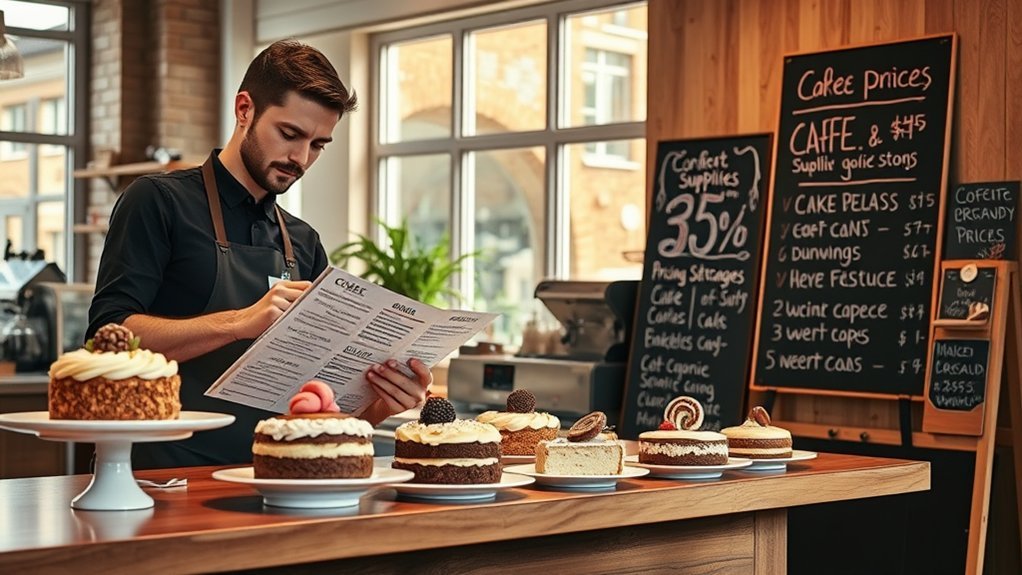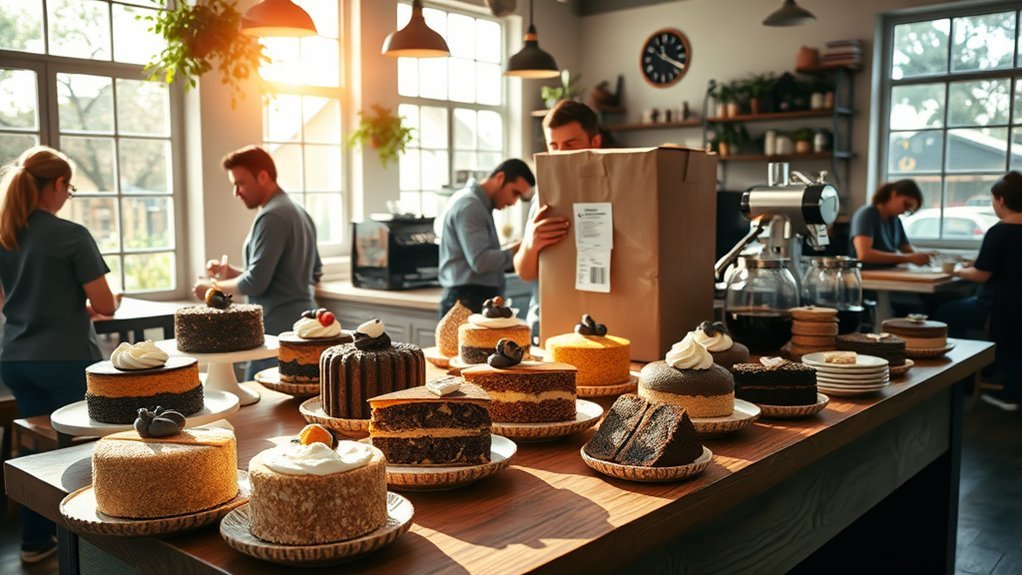What Coffee Shops Should Look for in an Organic Cake Supplier
When selecting an organic cake supplier, it's essential to focus on certification compliance and ingredient quality. Look for suppliers that adhere to UK organic standards, ensuring a minimum of 95% organic ingredients. Sourcing from local producers not only enhances flavour but also supports the community. Consider suppliers that offer flexible options, such as gluten-free or vegan cakes, to cater to a diverse range of customer preferences. Lastly, efficient supply chain management is crucial for resilience and building trust. These factors can significantly enhance your coffee shop's cake offerings.
Key Takeaways
- Ensure the supplier uses at least 95% organic ingredients and holds USDA certification to meet organic standards.
- Look for suppliers that provide a range of flavours and customisation options to suit various customer tastes.
- Prioritise suppliers who source ingredients locally, which boosts freshness and supports the local economy.
- Confirm the supplier's dedication to transparency in sourcing and ethical practices for sustainability.
- Evaluate the supplier's cost management to ensure competitive pricing without compromising on quality.
Certification and Compliance Standards

If you're thinking of starting an organic bakery, it's crucial to grasp certification and compliance standards. To gain organic certification, your products must contain at least 95% organic ingredients, all of which must be certified by a USDA-accredited agent. This not only ensures compliance with the USDA's National Organic Program but also shields your bakery from potential fines and damage to your reputation. You will need to keep detailed records of your production processes and ingredient sourcing, and you'll also undergo annual inspections. Maintaining detailed records is essential for demonstrating adherence to organic standards and ensuring a smooth certification process. Understanding the importance of organic certification standards will help you navigate the complexities of compliance effectively.
Navigating local and international regulations can add to the complexity. By investing time and resources into understanding these standards, you'll enhance your bakery's credibility and build consumer trust in the competitive organic market.
Quality of Ingredients and Sourcing

Ensuring the quality of ingredients is essential for any organic bakery, but the sourcing process is just as important for your product's reputation and sustainability. Choose suppliers who offer organic and non-GMO ingredients, as these align with consumer demand for healthier choices. Freshness is key; sourcing ingredients seasonally not only enhances flavour but also reduces your environmental footprint. Additionally, engaging with local farmers fosters community ties and strengthens the local economy. In this context, prioritizing certified organic ingredients can further enhance the integrity of your offerings. Transparency in sourcing is vital; know where your ingredients come from to ensure ethical practices. Opt for suppliers committed to sustainability, promoting biodiversity and minimising packaging waste. By supporting local farmers and maintaining clear communication with your suppliers, you can establish a dependable supply chain that reflects your dedication to quality and sustainability in your bakery products.
Product Flexibility and Customization

As consumer preferences shift towards personalised experiences, product flexibility and customisation in organic cakes are crucial for bakeries looking to meet a variety of dietary needs and tastes. Offering tailored options not only boosts customer satisfaction but also aligns with current market trends. Here are key considerations:
- Flavour variety: Allowing customers to select from a diverse range of flavours ensures that everyone can find something they enjoy.
- Dietary adaptations: Providing gluten-free, vegan, and low-sugar options caters to health-conscious consumers and those with dietary restrictions. Additionally, offering customized cakes made with organic and locally-sourced ingredients supports the growing demand for healthier choices. This approach not only enhances the nutritional profile of the cakes but also reflects the importance of sustainable farming practices that benefit the environment.
- Online platforms: User-friendly customisation tools make ordering straightforward and convenient for busy lifestyles.
Cost Management and Pricing Strategies

Effective cost management and strategic pricing are crucial for bakeries navigating the competitive organic cake market. By adopting a cost leadership strategy, you can take advantage of economies of scale, improving labour efficiency and sourcing ingredients at lower prices.
For instance, buying in bulk and forming partnerships with local suppliers can significantly reduce costs, while regularly monitoring utilities can lead to further savings.
On the other hand, a differentiation strategy enables you to charge a premium by offering high-quality ingredients and unique options, such as custom designs.
Understanding price elasticity is vital; this knowledge helps you set prices that meet market demand while ensuring profitability. Striking a balance between these approaches will help position your bakery as a go-to supplier, especially for coffee shops in search of top-notch organic cakes.
Supply Chain Management and Transparency

In today's competitive market, managing your supply chain with transparency is essential for bakeries looking to succeed. Effective supply chain management not only fosters resilience but also builds trust with your customers.
To accomplish this, consider the following:
- Clear communication with suppliers to ensure timely updates and efficient problem-solving. For instance, regular check-ins can help prevent misunderstandings.
- Risk assessment strategies to spot and address potential disruptions. This could involve evaluating the reliability of your suppliers and their delivery schedules.
- Supplier diversification to strengthen resilience and lessen dependency on a single source. For example, working with multiple flour suppliers can safeguard against shortages.
Frequently Asked Questions
How Can I Ensure the Supplier's Organic Certification Is Valid?
To ensure a supplier's organic certification is valid, check their certification processes against organic regulations and confirm they comply with the relevant UK standards. Review documentation from approved certifiers to ensure transparency and adherence to the necessary guidelines. For example, look for certification from the Soil Association or another recognised body. This will help you verify the authenticity of their organic claims.
What Is the Shelf Life of Organic Cakes?
You might assume that preserving organic cakes is straightforward, but the shelf life can differ significantly. Depending on the ingredients and how you store them, cakes can last anywhere from a few days to several weeks. For instance, a sponge cake may only keep for a few days at room temperature, while a fruit cake can last much longer if stored correctly. Proper handling is key to ensuring your cake stays fresh.
Do Organic Cake Suppliers Offer Tasting Samples?
Yes, organic cake suppliers commonly offer tasting samples at events, allowing you to try a variety of flavours. This helps you find the ideal cake for your occasion.
How Often Do Suppliers Update Their Product Offerings?
Suppliers usually update their product ranges every three months or with the changing seasons, responding to market trends and consumer preferences. Being aware of this update schedule can help you make the most of new product innovations for your business, ensuring you offer competitive and attractive choices. For example, a supplier might introduce a new line of eco-friendly products in spring, just in time for the summer shopping season.
What Are the Packaging Options for Organic Cakes?
When choosing packaging for organic cakes, it's important to use eco-friendly materials. Consider custom branding on compostable boxes or recyclable wraps. These options not only enhance your product's appeal but also demonstrate your commitment to sustainability, helping to attract environmentally conscious consumers.
Conclusion
When searching for the ideal organic cake supplier, it's essential to consider every detail, much like crafting a perfect cup of tea. Key factors include proper certification and high-quality ingredients, as these directly impact the taste of your offerings. By focusing on flexibility, cost-effectiveness, and a clear supply chain, you can enhance your café's reputation and create delicious cakes that keep customers returning. Choose carefully, and your cakes could become local favourites, much like a well-loved book.


